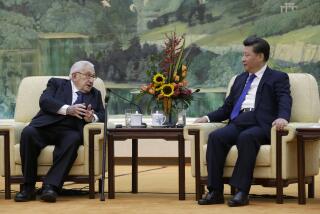Philip M. Kaiser, 93; longtime U.S. diplomat
- Share via
Philip M. Kaiser, a former ambassador to Austria, Hungary and Senegal who during the Cuban missile crisis acted to deny the Soviet Union landing rights at airports where Russian planes might refuel, died Thursday of aspiration pneumonia at Sibley Hospital in Washington, D.C., his family said. He was 93.
A former assistant secretary of Labor during the Truman administration, Kaiser served as the U.S. ambassador to the West African countries of Senegal and Mauritania from 1961 to 1964.
During the Cuban missile crisis in October 1962, he persuaded the Senegalese president to deny landing rights to Soviet airplanes.
Kaiser had earlier accompanied Senegal’s president, Leopold Sedar Senghor, on a visit to the White House, where he had a warm meeting with President Kennedy.
When Kaiser went to see the Senegalese president to ask him to deny the Soviets access to the airport at Dakar, the country’s capital, Senghor agreed.
“Anything President Kennedy wants,” Senghor said.
In 1977, President Carter named Kaiser ambassador to Hungary, and Kaiser played a key role in persuading the Carter administration to return the symbolic Crown of St. Stephen to Hungary in 1978. It had been in U.S. hands since 1945.
“We returned the crown. We got a trade agreement” giving Hungary favored trade status, Kaiser recalled in an oral history interview at the Harry S. Truman Library in Missouri. “We opened up the country to the West, and that relationship has continuously expanded.”
Kaiser, who also served as ambassador to Austria from 1980 to 1981, wrote about his years in the diplomatic service in his 1993 memoir “Journeying Far and Wide.”
Philip Mayer Kaiser was born in Brooklyn, N.Y., on July 12, 1913, the ninth of 10 children of Ukrainian-Jewish immigrants Moishe Bear and Tema Kaiser. He studied at the University of Wisconsin at Madison and, on a Rhodes scholarship, Oxford University.
Kaiser is survived by his wife, Hannah Greeley Kaiser; three sons, Robert G. Kaiser, an associate editor of the Washington Post, David Kaiser, a professor of history in the strategy department at the Naval War College in Newport, R.I., and Charles Kaiser, an author and journalist; and four grandchildren.
Charles Kaiser explained Thursday why he and his brothers all had become writers.
“At the dinner table every night, there was a competition to tell the best story. And if you didn’t tell the story as dramatically as possible, my father would lean forward and bellow, ‘Great reporter! You buried the lead of the story!’
“After a while, you never buried the lead again.”
More to Read
Sign up for Essential California
The most important California stories and recommendations in your inbox every morning.
You may occasionally receive promotional content from the Los Angeles Times.













